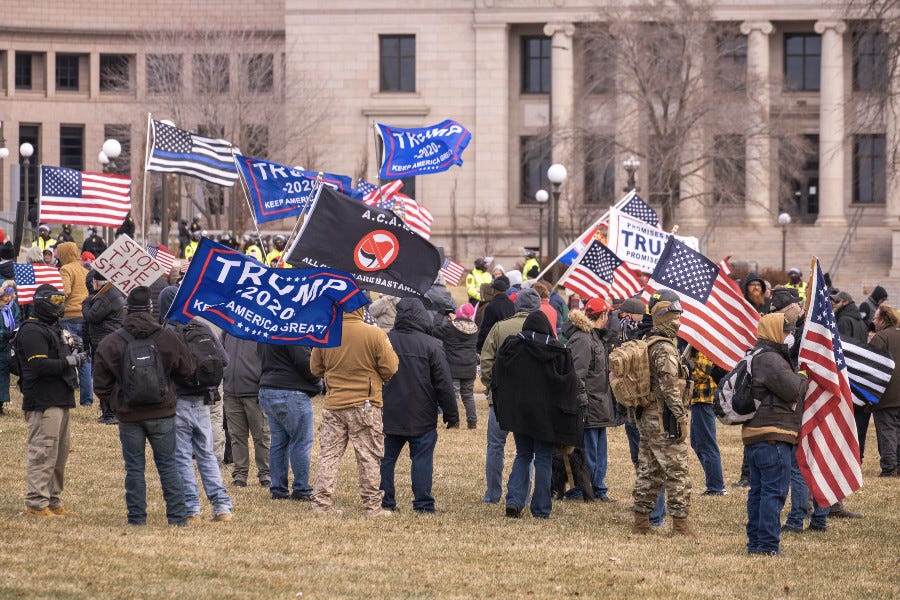Yesterday, some hundreds of people invaded the Capitol building in Washington, D.C., clashing with police, smashing windows, and forcing members to evacuate both chambers of Congress. It points to an urgent need to examine the damage done to our national social life.
For the Church in the United States, the events highlight the difficult task of addressing polemical voices within the Catholic community, in order for the Church to bear better witness in our national life.
The attack on the Capitol was a unique and, for many, deeply upsetting spectacle to behold. Catholic bishops joined national leaders of all kinds to express their shock. Archbishop Jose Gomez, president of the U.S. bishops’ conference, and Cardinal Wilton Gregory of Washington both issued statements condemning the lawlessness, and insisting on the need to recommit ourselves as a nation to adhering to common democratic values and mutual respect.
Los Angeles auxiliary Bishop Robert Barron called for a “national examination of conscience,” and after a year of widespread unrest, ever-deeping polarization, and a national conversation increasingly unmoored from the reality of facts, this seems an essential first step for national recovery.
The Catholic Church in the U.S. will certainly hope to play a role in leading that examination, and in witnessing to the love of neighbor which has become markedly absent from the national conversation. But, if the Church in this country is going to play a significant role in helping heal our civic society, it seems essential that it first conduct its own self-examination.
Cardinal Gregory, in his statement yesterday, said that “Those who resort to inflammatory rhetoric must accept some responsibility for inciting the increasing violence in our nation.” And indeed there seem to be several prominent Catholics who could shoulder some of this responsibility, both lay and clerical.
Fringe Catholic figures, like the YouTube polemicist Taylor Marshall, have cultivated an online audience of hundreds of thousands; while rejecting the legitimacy of the Church hierarchy and Vatican Council II, he has increasingly allied himself with the political conspiracy theorism and biblically apocalyptic rhetoric surrounding the “Stop the Steal” movement.
The former abortion worker-turned anti-abortion campaigner Abby Johnson, herself a public and prominent Catholic convert, has similarly used her pro-life work and credibility as a platform from which to both criticise the moral teaching authority of the Church and to champion the “Stop the Steal” campaign.
Fr. Frank Pavone, head of Priests for Life and who was for a time a board member of the organization “Catholics for Trump,” has been increasingly outspoken in his support for election conspiracy theories and calls for direct action in response.
Yesterday, Pavone tweeted that “What is intolerable is that a fraudulent, invalid, and illegitimate president would be inaugurated on January 20.” This follows earlier statements from the priest that “Every single [Democrat] should be out of office. Immediately. This is not disagreement. It is war.”
And, of course, there remains the figure of former apostolic nuncio Archbishop Carlo Maria Vigano, who, along with Marshall, appeared at the Jericho March rally in December.
On New Year’s Day, Vigano gave an interview with Steve Bannon in which he denounced the “infernal project” of “Bergoglio’s deep Church.”
At the same time, the archbishop told Americans, one assumes American Catholics in particular, that if they allow “the idea to spread among the masses that the electoral choice of the citizens – the first expression of democracy – can be manipulated and thwarted, it will be complicit in the fraud” of Trump’s defeat.
“If the United States misses this opportunity, now, it will be wiped out from history,” said Vigano in what many will have interpreted as a call to direct action.
Figures like Johnson, Marshall, Pavone, and Vigano have cultivated a growing audience among American Catholics by speaking with a directness and force which the hierarchy tends to avoid when confronted with the reality of hyperpartisan rancor within the national Catholic community. And they have done so by speaking against the Church itself, and, increasingly, in favor of a polemical politics which repurposes the Church’s moral priorities in support of partisan ends.
For years, the U.S. bishops have issued a document ahead of elections entitled Forming Consciences for Faithful Citizenship. It is a practical and measured handbook to help Catholics weigh policy priorities - including the preeminent concern for ending the genocide of legal abortion - in casting their votes. The title aptly captures the mission of the Church in the present moment.
The work of forming consciences for faithful citizenship clearly now must extend to framing the moral teaching of the Church on matters of policy and encompass how those essential priorities are articulated and championed, not just in the voting booth, but in the basic functioning of civil society.
It is clear that forming consciences for faithful citizenship has, in the light of recent events, become an urgent pastoral priority for the Church in America. It is a task which can school and prepare the faithful to play a prophetic role in the rebuilding of an obviously fractured and broken national society. If left undone, it can also leave the faithful as divided and prone to strife as the rest of the country, as has been shown by the growing influence of fringe voices.
If the bishops want to have a formational voice, it seems necessary that they recognize that divisive and combative figures have stepped into a gap at the heart of Catholic conversation. Addressing that will demand of them the stomach to challenge bitterly confrontational members of their own communities. It will, in all likelihood, be neither an easy or pleasant task, and will involve being on the receiving end of the kind of vitriolic and personal attacks which anyone would avoid if they could.
But, if the Church is to assume any kind of meaningful role in reforming a national society based upon love of neighbor and respect for the truth, the bishops will likely need to begin from within.

No comments:
Post a Comment